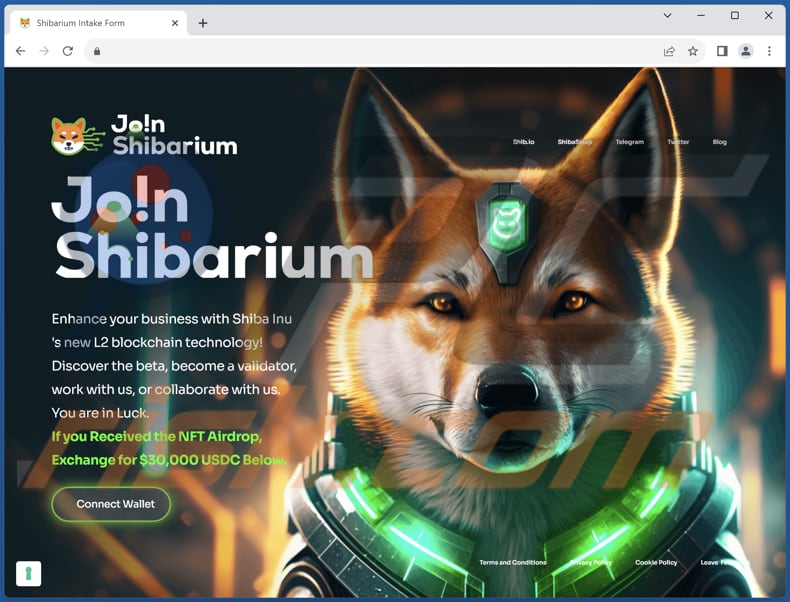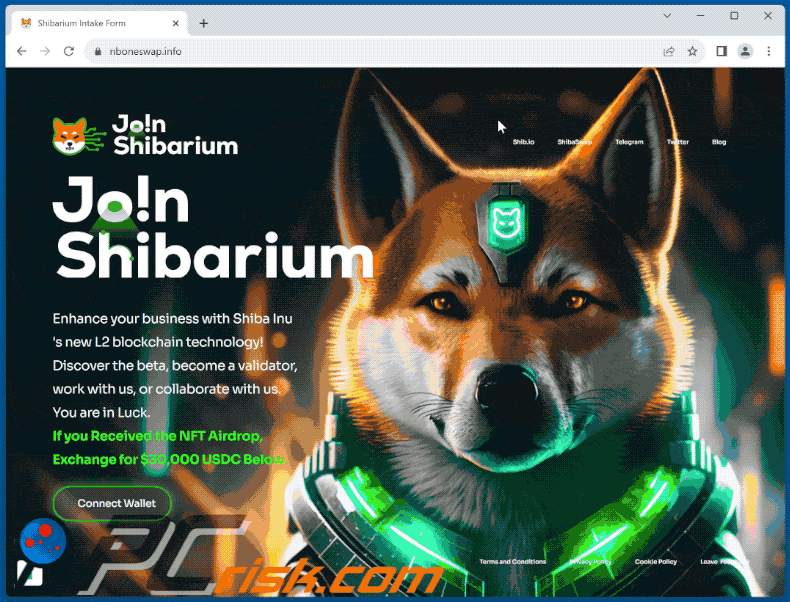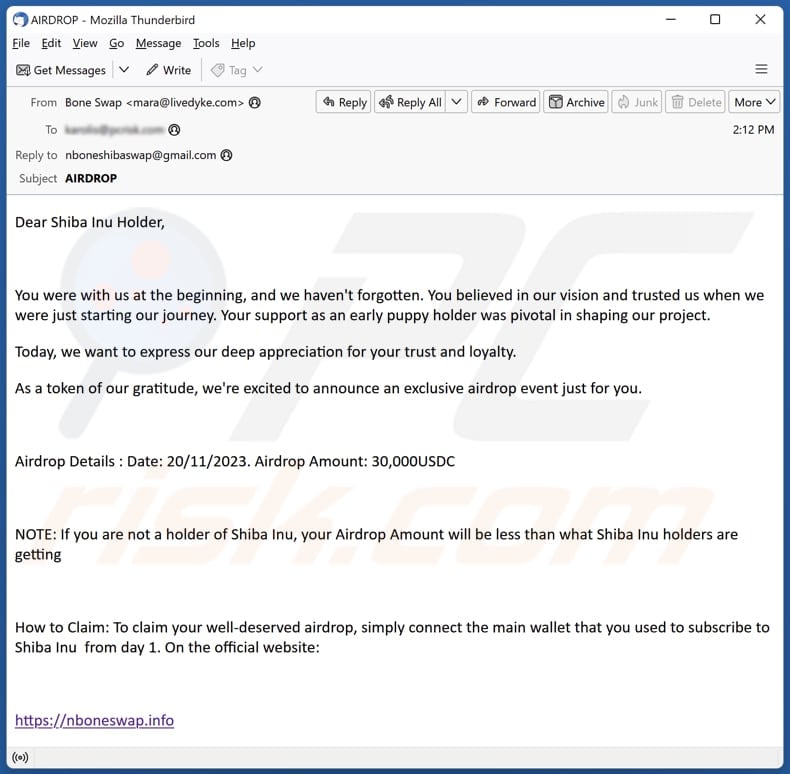How to avoid getting scammed through schemes like Shibarium scam campaign
Phishing/ScamAlso Known As: Shibarium crypto scam
Get free scan and check if your device is infected.
Remove it nowTo use full-featured product, you have to purchase a license for Combo Cleaner. Seven days free trial available. Combo Cleaner is owned and operated by RCS LT, the parent company of PCRisk.com.
What kind of scam is the fake Shibarium campaign?
Upon scrutinizing a phishing email cleverly masked as a notification related to a crypto project (airdrop) supposedly involving the distribution of tokens as community rewards, it has become evident that the scam's objective is to deceive recipients. The fraudulent email aims to lure individuals into visiting a phishing website and disclosing sensitive personal information.

More about the Shibarium scam
In the fraudulent email, the scammer addresses the recipient as a Shiba Inu holder, emphasizing their integral role in the early stages of the project and expressing gratitude for the trust and loyalty demonstrated. The email claims to offer an exclusive airdrop event as a token of appreciation, with details specifying a date and an airdrop amount of 30,000 USDC.
The scammer highlights that the airdrop is exclusively for Shiba Inu holders and instructs recipients to claim their reward by connecting their main wallet through a provided link to the official website. The message concludes by reiterating the appreciation for the recipient's early support and welcoming them to the Shiba Inu Fami
The deceptive email leads recipients to a fraudulent website designed for scamming, directing them to connect their crypto wallet. The malicious intent behind this deceitful site is to illicitly obtain sensitive information, particularly crypto wallet login credentials.
Victims falling prey to this scam may experience substantial financial losses and potential compromise of their cryptocurrency assets. Additionally, unauthorized access to personal information poses risks of identity theft and other fraudulent activities.
| Name | Shibarium Scam |
| Threat Type | Phishing, Scam, Social Engineering, Fraud |
| Fake Claim | Recipients can receive a reward of 30,000 USDC |
| Related Domain | nboneswap[.]info |
| Detection Names (nboneswap[.]info) | alphaMountain.ai (Malicious), Avira (Phishing), Cluster25 (Phishing), PhishFort (Malicious), Sophos (Malware), Full List Of Detections (VirusTotal) |
| Disguise | Legitimate crypto giveaway |
| Symptoms | Unauthorized online purchases, changed online account passwords, identity theft, illegal access of the computer. |
| Distribution methods | Deceptive emails, rogue online pop-up ads, search engine poisoning techniques, misspelled domains. |
| Damage | Loss of sensitive private information, monetary loss, identity theft. |
| Malware Removal (Windows) |
To eliminate possible malware infections, scan your computer with legitimate antivirus software. Our security researchers recommend using Combo Cleaner. Download Combo CleanerTo use full-featured product, you have to purchase a license for Combo Cleaner. 7 days free trial available. Combo Cleaner is owned and operated by RCS LT, the parent company of PCRisk.com. |
Similar scams in general
Crypto scams often create a sense of urgency or exclusivity, encouraging victims to act quickly to claim a reward, in the described case, a crypto airdrop. Also, these scams involve phishing tactics, directing victims to fraudulent websites under the guise of claiming rewards or benefits, where their sensitive information, such as crypto wallet credentials, is then maliciously harvested.
Other crypto scams are aimed at tricking unsuspecting individuals into transferring scammers their crypto funds. More examples of similar scams are "Brad Garlinghouse Crypto Giveaway", "Apple Crypto Giveaway", and "The Bored Ape Pixel Club". It is important to note that fraudulent emails containing links or files can be used to deliver malware.
How do spam campaigns infect computers?
Cybercriminals send emails with seemingly innocuous attachments, such as documents or spreadsheets, that contain hidden malicious code. When users open these attachments, the malware can be executed, leading to the compromise of the user's computer. Opening links in emails used to deliver malware can also lead to computer infections.
Cybercriminals commonly use executable files (.exe), Microsoft Office documents with malicious macros, JavaScript files (.js), PDFs with embedded scripts, and compressed archive files (.zip, .rar) to deliver malware via email.
How to avoid installation of malware?
Firstly, keeping all software, including the operating system, browsers, and security software, up to date is crucial. Regular updates often include patches that address vulnerabilities exploited by malware. Secondly, installing reputable antivirus and anti-malware software provides a critical layer of defense against various types of malware.
Additionally, users should be cautious when dealing with emails containing files or links, encountering ads and pop-ups on shady websites, and receiving requests from dubious sites to send notifications. Avoiding pirated software, cracking tools, and unofficial key generators is also important.
If you have already opened malicious attachments, we recommend running a scan with Combo Cleaner Antivirus for Windows to automatically eliminate infiltrated malware.
The appearance of the fraudulent website (GIF):

Screenshot of the email promoting the Shibarium scam:

Text presented in the "Shibarium" email letter:
Dear Shiba Inu Holder,
You were with us at the beginning, and we haven't forgotten. You believed in our vision and trusted us when we were just starting our journey. Your support as an early puppy holder was pivotal in shaping our project.
Today, we want to express our deep appreciation for your trust and loyalty.
As a token of our gratitude, we're excited to announce an exclusive airdrop event just for you.
Airdrop Details : Date: 20/11/2023. Airdrop Amount: 30,000USDC
NOTE: If you are not a holder of Shiba Inu, your Airdrop Amount will be less than what Shiba Inu holders are getting
How to Claim: To claim your well-deserved airdrop, simply connect the main wallet that you used to subscribe to Shiba Inu from day 1. On the official website:
hxxps://nboneswap.info
We want to ensure that the reward reaches the right hands, yours.
Claim 30,000USDC
This airdrop is our way of saying thank you for believing in our project from the very beginning. You deserve to be rewarded for your trust in us as we started this adventure together.
Welcome to the Shiba Inu Family!
Instant automatic malware removal:
Manual threat removal might be a lengthy and complicated process that requires advanced IT skills. Combo Cleaner is a professional automatic malware removal tool that is recommended to get rid of malware. Download it by clicking the button below:
DOWNLOAD Combo CleanerBy downloading any software listed on this website you agree to our Privacy Policy and Terms of Use. To use full-featured product, you have to purchase a license for Combo Cleaner. 7 days free trial available. Combo Cleaner is owned and operated by RCS LT, the parent company of PCRisk.com.
Quick menu:
- What is Shibarium crypto scam?
- Types of malicious emails.
- How to spot a malicious email?
- What to do if you fell for an email scam?
Types of malicious emails:
![]() Phishing Emails
Phishing Emails
Most commonly, cybercriminals use deceptive emails to trick Internet users into giving away their sensitive private information, for example, login information for various online services, email accounts, or online banking information.
Such attacks are called phishing. In a phishing attack, cybercriminals usually send an email message with some popular service logo (for example, Microsoft, DHL, Amazon, Netflix), create urgency (wrong shipping address, expired password, etc.), and place a link which they hope their potential victims will click on.
After clicking the link presented in such email message, victims are redirected to a fake website that looks identical or extremely similar to the original one. Victims are then asked to enter their password, credit card details, or some other information that gets stolen by cybercriminals.
![]() Emails with Malicious Attachments
Emails with Malicious Attachments
Another popular attack vector is email spam with malicious attachments that infect users' computers with malware. Malicious attachments usually carry trojans that are capable of stealing passwords, banking information, and other sensitive information.
In such attacks, cybercriminals' main goal is to trick their potential victims into opening an infected email attachment. To achieve this goal, email messages usually talk about recently received invoices, faxes, or voice messages.
If a potential victim falls for the lure and opens the attachment, their computers get infected, and cybercriminals can collect a lot of sensitive information.
While it's a more complicated method to steal personal information (spam filters and antivirus programs usually detect such attempts), if successful, cybercriminals can get a much wider array of data and can collect information for a long period of time.
![]() Sextortion Emails
Sextortion Emails
This is a type of phishing. In this case, users receive an email claiming that a cybercriminal could access the webcam of the potential victim and has a video recording of one's masturbation.
To get rid of the video, victims are asked to pay a ransom (usually using Bitcoin or another cryptocurrency). Nevertheless, all of these claims are false - users who receive such emails should ignore and delete them.
How to spot a malicious email?
While cyber criminals try to make their lure emails look trustworthy, here are some things that you should look for when trying to spot a phishing email:
- Check the sender's ("from") email address: Hover your mouse over the "from" address and check if it's legitimate. For example, if you received an email from Microsoft, be sure to check if the email address is @microsoft.com and not something suspicious like @m1crosoft.com, @microsfot.com, @account-security-noreply.com, etc.
- Check for generic greetings: If the greeting in the email is "Dear user", "Dear @youremail.com", "Dear valued customer", this should raise suspiciousness. Most commonly, companies call you by your name. Lack of this information could signal a phishing attempt.
- Check the links in the email: Hover your mouse over the link presented in the email, if the link that appears seems suspicious, don't click it. For example, if you received an email from Microsoft and the link in the email shows that it will go to firebasestorage.googleapis.com/v0... you shouldn't trust it. It's best not to click any links in the emails but to visit the company website that sent you the email in the first place.
- Don't blindly trust email attachments: Most commonly, legitimate companies will ask you to log in to their website and to view any documents there; if you received an email with an attachment, it's a good idea to scan it with an antivirus application. Infected email attachments are a common attack vector used by cybercriminals.
To minimise the risk of opening phishing and malicious emails we recommend using Combo Cleaner Antivirus for Windows.
Example of a spam email:

What to do if you fell for an email scam?
- If you clicked on a link in a phishing email and entered your password - be sure to change your password as soon as possible. Usually, cybercriminals collect stolen credentials and then sell them to other groups that use them for malicious purposes. If you change your password in a timely manner, there's a chance that criminals won't have enough time to do any damage.
- If you entered your credit card information - contact your bank as soon as possible and explain the situation. There's a good chance that you will need to cancel your compromised credit card and get a new one.
- If you see any signs of identity theft - you should immediately contact the Federal Trade Commission. This institution will collect information about your situation and create a personal recovery plan.
- If you opened a malicious attachment - your computer is probably infected, you should scan it with a reputable antivirus application. For this purpose, we recommend using Combo Cleaner Antivirus for Windows.
- Help other Internet users - report phishing emails to Anti-Phishing Working Group, FBI’s Internet Crime Complaint Center, National Fraud Information Center and U.S. Department of Justice.
Frequently Asked Questions (FAQ)
Why did I receive this email?
Criminals dispatch identical messages to a multitude of recipients in the anticipation that someone will be deceived by their tactics. These spam emails lack any personalization and are mass-distributed with the aim of exploiting unsuspecting individuals.
I have provided my personal information when tricked by this email, what should I do?
Immediately change the seed phrase, password, or other login information for your compromised crypto wallet and inform the customer support team of your crypto wallet about the situation.
I have downloaded and opened a malicious file attached to an email, is my computer infected?
If you have downloaded and opened a malicious file attached to an email, there is a risk that your computer could be infected. It depends on the file type, as not all malicious files can inject malware upon opening them (certain file types require additional actions like enabling macros commands).
I have sent cryptocurrency to the address presented in such email, can I get my money back?
Transactions of this nature are nearly impossible to trace, making recovery unattainable.
I have read the email but did not open the attachment, is my computer infected?
It is safe to open emails. The risk arises when one clicks on links within the email or opens attached files, as these actions can result in system infections.
Will Combo Cleaner remove malware infections that were present in email attachment?
Combo Cleaner possesses the ability to identify and eradicate the majority of well-known malware infections. It is crucial to be aware that advanced malware often conceals itself in the depths of the system. Hence, conducting a thorough scan is imperative for effective detection and removal.
Share:

Tomas Meskauskas
Expert security researcher, professional malware analyst
I am passionate about computer security and technology. I have an experience of over 10 years working in various companies related to computer technical issue solving and Internet security. I have been working as an author and editor for pcrisk.com since 2010. Follow me on Twitter and LinkedIn to stay informed about the latest online security threats.
PCrisk security portal is brought by a company RCS LT.
Joined forces of security researchers help educate computer users about the latest online security threats. More information about the company RCS LT.
Our malware removal guides are free. However, if you want to support us you can send us a donation.
DonatePCrisk security portal is brought by a company RCS LT.
Joined forces of security researchers help educate computer users about the latest online security threats. More information about the company RCS LT.
Our malware removal guides are free. However, if you want to support us you can send us a donation.
Donate
▼ Show Discussion